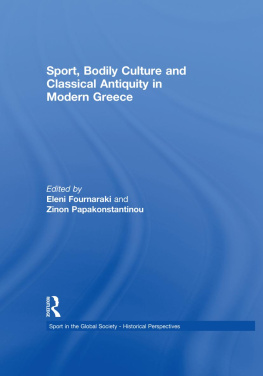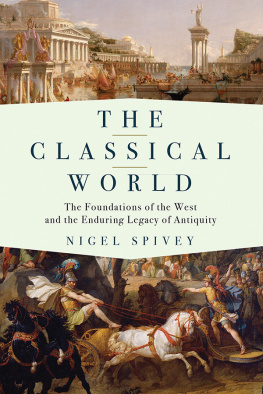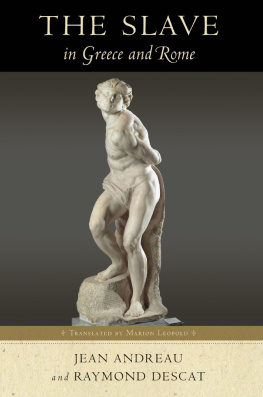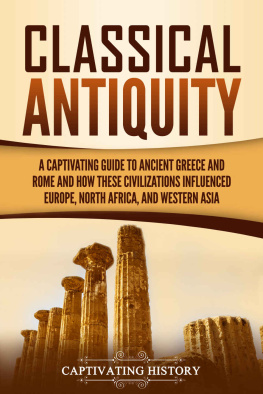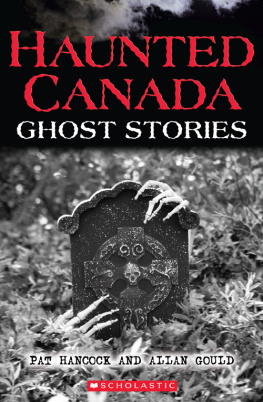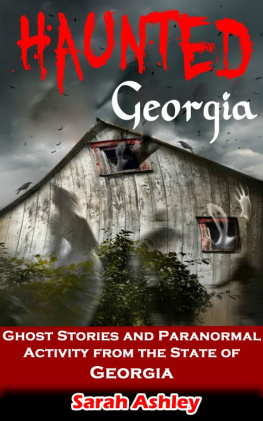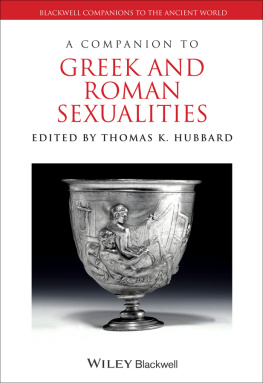Debbie Felton - Haunted Greece and Rome
Here you can read online Debbie Felton - Haunted Greece and Rome full text of the book (entire story) in english for free. Download pdf and epub, get meaning, cover and reviews about this ebook. publisher: University of Texas Press, genre: Religion. Description of the work, (preface) as well as reviews are available. Best literature library LitArk.com created for fans of good reading and offers a wide selection of genres:
Romance novel
Science fiction
Adventure
Detective
Science
History
Home and family
Prose
Art
Politics
Computer
Non-fiction
Religion
Business
Children
Humor
Choose a favorite category and find really read worthwhile books. Enjoy immersion in the world of imagination, feel the emotions of the characters or learn something new for yourself, make an fascinating discovery.
- Book:Haunted Greece and Rome
- Author:
- Publisher:University of Texas Press
- Genre:
- Rating:3 / 5
- Favourites:Add to favourites
- Your mark:
- 60
- 1
- 2
- 3
- 4
- 5
Haunted Greece and Rome: summary, description and annotation
We offer to read an annotation, description, summary or preface (depends on what the author of the book "Haunted Greece and Rome" wrote himself). If you haven't found the necessary information about the book — write in the comments, we will try to find it.
An innovative, interdisciplinary study combining a modern folkloric perspective with literary analysis of ghost stories from classical antiquity.
Haunted Greece and Rome — read online for free the complete book (whole text) full work
Below is the text of the book, divided by pages. System saving the place of the last page read, allows you to conveniently read the book "Haunted Greece and Rome" online for free, without having to search again every time where you left off. Put a bookmark, and you can go to the page where you finished reading at any time.
Font size:
Interval:
Bookmark:
HAUNTED GREECE AND ROME
HAUNTED GREECE AND ROME
Ghost Stories from Classical Antiquity
D. FELTON

University of Texas Press
AUSTIN
Copyright 1999 by the University of Texas Press
All rights reserved
Printed in the United States of America
First edition, 1999
Requests for permission to reproduce material from this work should be sent to Permissions, University of Texas Press, P.O. Box 7819, Austin, TX 78713-7819.
LIBRARY OF CONGRESS CATALOGING-IN-PUBLICATION DATA
Felton, D., 1964
Haunted Greece and Rome: ghost stories from classical antiquity / D. Felton.
p. cm.
Based on authors thesis (Ph.D.)University of North Carolina.
Includes bibliographical references (p. ) and indexes.
ISBN 0-292-72507-8 (cloth : alk. paper). ISBN 0-292-72508-6 (pbk. : alk. paper)
1. Classical literatureHistory and criticism. 2. Ghosts in literature. 3. Ghost stories, ClassicalHistory and criticism. 4. Literature and folkloreGreece. 5. Literature and folkloreRome. 6. GhostsGreece. 7. GhostsRome. I. Title.
PA3015.G48F45 1999
880.09dc21 98-39213
ISBN 978-0-292-75732-5 (e-book)
ISBN 978-0-292-78924-1 (individual e-book)
D M
Talking of ghosts, he said, It is wonderful
that five thousand years have now elapsed
since the creation of the world, and still it
is undecided whether or not there has ever
been an instance of the spirit of any person
appearing after death. All argument is
against it; but all belief is for it.
JAMES BOSWELL
Life of Johnson
The same ignorance makes me so bold as
to deny absolutely the truth of the various
ghost stories, and yet with the common,
though strange, reservation that while I
doubt any one of them, still I have faith
in the whole of them taken together.
IMMANUEL KANT
Dreams of a Spirit-Seer
Should Latin, Greek, and Hebrew fail,
I know a charm which must prevail:
Take but an ounce of Common Sense,
Twill scare the Ghosts and drive em hence.
Public Advertiser
(LONDON),
5 FEBRUARY 1762
PREFACE
WHILE I WAS DOING GRADUATE WORK IN CLASSICS AT THE University of North Carolina at Chapel Hill, I was introduced to one of the most famous ghost stories from antiquity, Pliny the Youngers tale of a haunted house at Athens. One of the requirements in the program was a course on Latin composition, and our professor, Larry Stephens, had assigned Plinys story to illustrate the different uses of the imperfect and perfect tenses in a narrative. I had little talent for Latin composition; with apologies to Dr. Stephens, I must admit that I found the supernatural content of the story far more interesting than the technicalities of Plinys excellent prose style, and I was soon wondering whether there were many more ghost stories like Plinys surviving from Greece and Rome. As it turned out, there were a great many ghost stories of all kinds. I wanted to write a dissertation on the topic, but as the amount of available material could easily have filled an encyclopedia, I decided to concentrate only on the haunted-house stories. For this book, the dissertation has been greatly revised and expanded to include other types of haunting as well.
There are still many kinds of ghost story excluded from this study. Some people may be disappointed to find that tales of necromancy, of spirit possession, of trips to the underworld, and of witchcraft are not discussed in any detail in these pages. The ghost of Darius from Aeschyluss Persians, invoked by his people after their defeat by the Greeks, is mentioned only in passing. The witch Erictho from Lucans Pharsalia, who compels a corpse to speak in what must be the most gruesome necromantic scene ever written, does not make an appearance here. Nor does the wounded werewolf from Petroniuss Satyricon. The shades of the dead who inhabit the White Isle, too, are absent. Instead, this book focuses on hauntings, cases of revenants and apparitions that come back from the dead of their own accord, appearing to people of this world in order to warn them of danger, to prophesy, to take revenge, to request proper burial, or simply to comfort the living.
Although this study of ghost stories originated as a dissertation written in fulfillment of a Ph.D. in Classics, in its current form the book is intended to appeal not only to classicists but to a wider audience, including folklorists and students of English literature and, ideally, anyone interested in a good ghost story. To make this book accessible to nonclassicists, I have moved nearly all of the Greek and Latin passages into the notes and have provided my own translations of them for the main text.
I am grateful to many people for their assistance and patience during the writing of this book. I thank my original dissertation committee, particularly Kenneth Reckford and George Houston, for allowing me to write on a folkloric topic and for their careful direction. I owe a particular debt to Bill Hansen, who for years now has been a mentor to me concerning folklore in classical literature. I would also like to thank Adrienne Mayor for bringing many of these ghost stories to my attention, Don Lateiner for spending so much time discussing crisis apparitions with me, and Sylvia Grider for generously allowing me to preview her paper on haunted houses in literature and culture. Jeff Carnes, Dave Johnson, Marybeth Lavrakas, Joan OBrien, Shawn OBryhim, and Lisa Splittgerber read the manuscript at various stages, and I am very grateful for their valuable comments and suggestions. I thank the Center for Hellenic Studies in Washington, D.C., for a fellowship that allowed me the time and resources to concentrate on parts of this book during the summer of 1996. Thom Thibeault of Southern Illinois University provided technical support during the final stages of writing. I am particularly grateful for the expert guidance of several people associated with the University of Texas Press, including Ali Hossaini, Jim Burr, Leslie Tingle, and copyeditor Sherry Wert.
Finally, I wish to thank my family and friends, without whose encouragement, support, and patience this book would not have been completed.
INTRODUCTION
THIS IS A BOOK ABOUT HAUNTINGSHAUNTINGS RECORDED TWO thousand years ago by the writers of ancient Greece and Rome. Stories of hauntings and other kinds of ghostly manifestation seem to have been as popular in antiquity as they are today, and reports of hauntings are found in many different types of literature surviving from the classical world. They appear in the epic poetry of Homer and Vergil, the tragedies of Aeschylus and Seneca, the histories of Herodotus and Tacitus, the geography of Pausanias, the biographies of Plutarch, and many other genres. The comedies of Plautus, the letters of Pliny the Younger, and the satires of Lucian contain some of the best-known tales of hauntings from ancient times.
Haunting is the repeated manifestation of strange and inexplicable sensory phenomenasounds, tactile sensations, smells, and visual hallucinationsgenerally said to be caused by ghosts or spirits attached to a certain locale.
Despite the apparent popularity of these tales in antiquity, few studies of ancient ghost stories exist, and little has been written about ghosts as folkloric or literary figures in antiquity. Because relatively few stories of any length have survived, researchers are left almost no context in which to analyze them. The corpus available for study seems limited, because the longer storiessuch as those of Plautus, Pliny, and Lucianare only a few paragraphs in length, whereas the majority of ghost stories are only a few sentences long.
Next pageFont size:
Interval:
Bookmark:
Similar books «Haunted Greece and Rome»
Look at similar books to Haunted Greece and Rome. We have selected literature similar in name and meaning in the hope of providing readers with more options to find new, interesting, not yet read works.
Discussion, reviews of the book Haunted Greece and Rome and just readers' own opinions. Leave your comments, write what you think about the work, its meaning or the main characters. Specify what exactly you liked and what you didn't like, and why you think so.


